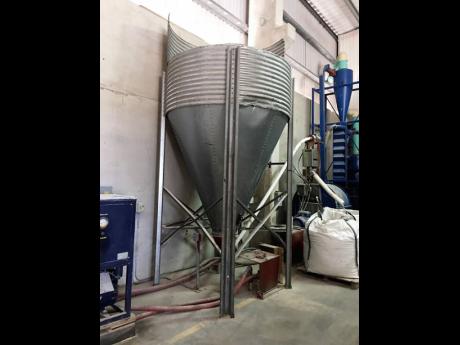With 80 million PET bottles produced per month - Businessman investing US$3m to recycle plastic into tiles
WESTERN BUREAU:
Twenty-four years after pioneering one of the country's most successful hospitality distribution entities, Tom Tyler has waded into new territory.
This time, the Montego Bay-based businessman, who co-founded Caribbean Producers Jamaica (CPJ), is focusing his energy and passion on the environment and a green economy.
Inspired by his son, who died tragically weeks before collecting his degree in Environmental Studies and Business from New York University two years ago, Tyler has founded Innovative Construction Materials Limited (ICML), a company that will produce roof tiles from plastic bottles.
"My son's passion was always to save the world, save the environment," Tyler tells the Financial Gleaner.
The roof tiles are being manufactured under the brand Duratile, a lighter weighted tile than traditional slay or clay.
The businessman, who now chairs ICML, is pumping US$3 million into the business, has partnered with Barbadian contractor and raw materials producer, Mark Maloney, and has purchased land next door the Retirement dump in St James for the project, which will help the government in its fight against plastic.
For the last year, Tyler said he has been working on acquiring the land, getting the proper licence and putting staff requirements in place. According to him, he received tremendous support in securing the land from the Housing Agency of Jamaica (HAJ).
"There is an estimated 80 million bottles produced per month in Jamaica. Out of the 80 million, we can consume at full capacity 15 to 18 million, almost 20 per cent. That will produce about 150,000 square feet of roofing material," stated the ICML chairman.
His Duratile slate roofing replicates the look of natural slate and adds prestige and character to any architectural style of building. "And it takes 35 bottles to make one shingle," Tyler explained, adding that the warranty on the roof tiles is 20 years.
"It is like a cedar shingle, but it is PET (polyethylene terephthalate) and it does not deteriorate," he assured.
Having broken ground for the factory, Tyler says employment is being created for some 35 persons. He will construct not one, but two factories and is currently in negotiations with Wisynco, through the bottle consortium, to do a depot for the west, which will collect, sort and shred the PET, which is another phase of the business, he tells The Financial Gleaner.
The Montego Bay businessman said that after doing his due diligence in Barbados before setting up shop in Jamaica, the first person he met on his return was his friend and competitor, William Mahfood of Wisynco.
"William was very encouraging and very interested. Upon further investigation, I understood that Wisynco contributed 50 to 60 per cent of the output of PET; other players being Pepsi, LASCO, Catherine's Peak and CPJ's Lifespan," said Tyler.
An existing Duratile plant in Barbados is being moved to Jamaica, a move Tyler's partner Maloney said he was extremely excited about.
Maloney, who operates that plant, explains that Duratile has been around for 15 years, and he has used recycled PET to manufacture high-quality, durable and aesthetically pleasing, and most of all environmentally friendly roofing tiles for a roofing system that stands out.
"We have seen a significant decrease in the littering of plastic bottles in Barbados over the years," he revealed.
Even while commending the Government of Jamaica on its bold initiative and announcement to ban plastics starting in January 2019, Maloney said there was still a lot to do in the rest of the region.
Jamaica has made the right decision with imposing the ban which will force recycling. "This will create a new industry, save foreign exchange, assist in cleaning up the country and also have a huge positive impact on the marine environment, as the worst thing for the sea and its inhabitants is plastic," he stated.
Like his business partner, Maloney acknowledges that the world market for PET has dropped dramatically.
So, plastics that used to be valuable enough to export is now not an attractive demand, with the world being more cluttered.
"Before, India and China would buy compressed plastic and process it into something else, but that's not happening anymore. They have got too much of their own so they don't need ours," argued Tyler.
Noting that there was a need to find ways of converting the country's waste into durable materials, he said his venture will also help to reduce the consumption of imported roofing.
Wisynco's William Mahfood has lauded the initative, tagging it critical and synergistic to the recycling efforts.
"There is no other local company using the scrap for recycling. It is a very important initiative," he said.
He noted that in order for Tyler and his partner to make his plant more viable, he needs lower cost and higher volume of input from the collection of Recycle Partners Jamaica Limited, a joint venture between the Government and the beverage industry. Recycle Partners Jamaica Limited's primary purpose is to present opportunities for a national recycling effort.
Minister of Industry, Commerce, Agriculture and Fisheries Audley Shaw said the ICML project represents one of two major proposals presented to the government for recycling operation.
"The two of them combined will be able to cope with close to one half of the plastic bottles consumed in Jamaica at this time," he said.
"This is a major step because a portion of the recycling will include waste to energy conversion, as well as a recycling of materials that are produced. These are significant in terms of the environmental problems that we face," the minister said.
What the country must now focus on in order to prepare itself, said Shaw, is to prepare itself to adopt first-world standards of separating garbage in the homes.
"We need to separate solid from recyclable material. That is a well-established practice in the USA and other developed countries. We have to begin with that," said Shaw.



